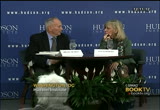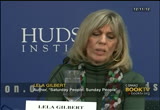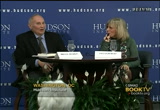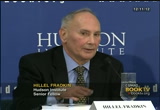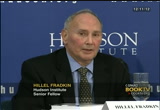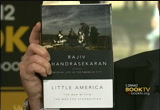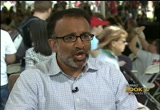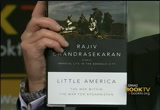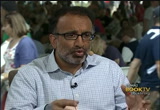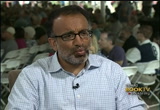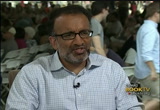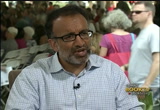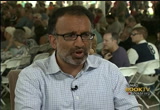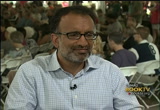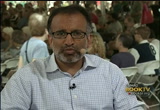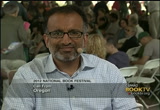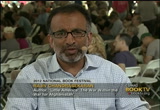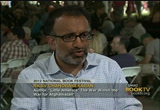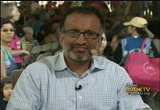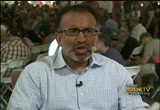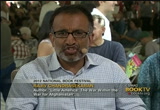tv Book TV CSPAN December 30, 2012 7:15am-7:45am EST
7:15 am
talk about, for example, when you went to see the pastor in the hospital. what does she make of this? what does she make of you? not necessary what did she make of you, but what do israelis know about christians and think about them? >> well, i'll start by saying why it went to israel. because that leads into the rest. i went because i always wanted to see israel. my father was an ardent zionist, christian. he used to send $15 a month to some little build israel organization. when my mother thought we didn't have enough money to send it, he sent it anyway. so always thought -- >> you didn't talk? >> i found out later. but i thought i would go with him, but he died before it worked out. so i was action on a trip in 2006, and i was in nuevo, a beach from which you can see
7:16 am
saudi arabia, jordan and israel. year in egypt and i thought if i don't get myself there, i'm never going. i'm going to be like moses having seen the land that never entered. [laughter] and i made a reservation with the mileage i had. i decided instead of doing some dumb sure, i would rent an apartment for a few months and just take my work with me, since i write, i could do that, which i did. i did know anyone there. i didn't have one in. i have teams, i didn't know anybody. and as i said i ended up going during a war, but it wasn't even sure what was going to happen. i stayed because i love it and it didn't need to come back. i mean, i would come back to work every few months, but i met somebody good friends. i have more good friends there that ahead in california. i have kids in california and family. i don't know what happened and
7:17 am
why i'm still there, quite frankly. it's just that, i can tell you i haven't mastered the language which is one of the great failures of my life, but i still don't want to leave. but as far as what people think, first of all, you go into israel. there are million kinds of jews. there's any kind of religious sect your every kind of secular to synagogue, secular so what nothing to do with any of it. and then every degree of orthodox, certain ways of tipping the hat, certain kinds of beards. i don't know, i don't know what a monolithic jewish community is. and the same is true of christians. christian cevaer, the arab christians first of all have very little to do with evangelical western christians that go in for various reasons.
7:18 am
it's just a hodgepodge. so what people think it is going to be what they think of you personally. i don't think very many people are judged on their christianity or judaism, unless they're just totally obnoxious. >> there's a few of those. >> definitely. i mean, the fear against christians amongst the orthodox, or we have an angle from how bringing forth armageddon reports time, or i don't know. and i don't know anybody that does the. i heard the story, that's what these jews thought of and i've never don't a christian that had the motivation. i know some that want to talk about the faith, but i mean in terms of converting jews to bring forth the end of days, i don't know anybody that does that. and so there's that fear, but people get all that once they get to know you.
7:19 am
as far as we're concerned will just close friends. i think she was very impressed, because he was so outspoken and it was so much a part of what form tended and his courage at becoming a christian under the threat of death, and as it turned out near-death is what happened to them. i think she is very impressed with it. she's very moved by him come and we all are because he bears on his body the suffering of true faith and of courage. and i hope he comes here to america to speak your. i think he has a good message. you're not supposed to be reading. >> i know. but there was something -- i have many more questions, but i think i will focus lastly on one
7:20 am
issue that's been, comes out powerful in the book. i recall when you were talking about, it comes up in different ways. that when you're talking about the issue of jews from muslim countries, you mentioned, i guess you asked someone or someone was asked why didn't these jews make a big deal out of this. and one of the things, and one person responded, said we were just not about looking back. we were about starting over and rebuilding, and that's what we are today. i mean, it's true today that there's more of, there's an attempt to raise this issue. i think partially because people, it has a bearing on the question of the palestinian
7:21 am
refugees, but otherwise, the people were not inclined really to raise it. it was more about getting on with life and building a new life. similarly, in an odd way not willing on death, which is another aspect of this, which even the death is very much a part of the israeli experience, you know, usually because it's not every family that has lost someone in funding or terrorist attacks, but every fighting has a friend who is lost or a friend of a friend. >> or the holocaust. >> or the holocaust. but nontheless, death is not especially -- i thought the most powerful example you use, you
7:22 am
offered was your account of having attended a memorial that's held annually for a death. that is to say, the death of a famous israeli soldier. and what i was struck by in your accounting was of course this is a sad event, he's dead and so forth, but the spirit of the event is not preoccupied. >> no. no, i think the reason israelis are so able to be joyful and have holidays and singing and everything else, because they have a perspective of death and life, that a lot of americans don't have. his memorial service is really a tribute to the nation, nation of israel. >> i take it for granted people may know, but maybe to do. he was the commander of the radon and heavy in 1986, which
7:23 am
was the spectacular commando raid that rescue people have been taken hostage by palestinians and terrorists, and flown, plausibly to uganda. he was the only casualty on the israeli side. >> it was a miraculous -- >> turn of events. >> he's also the older brother of prime minister benjamin netanyahu, and there's another brother. so he was, and the father is very famous, too. he's quite a great hero in the eyes of the israeli people. but the point of it all is that yes, everyone has been touched i death and bylaws, and by horror. there's so many -- but people recognize that life is precious when they face these things. i think you really know how to
7:24 am
celebrate it. they don't, the night of the first siren went off in jerusalem, i thought something had gone wrong with the siren and it didn't really get it right away. them i never came to the door and she said are you all right? i said yes. she said that was an air raid siren. she said you had to come to dinner. it was friday night, and so i didn't really want to go because i wanted to surf the net and see what happened last night i couldn't really use my phone because -- she said put in your pocket and put on vibrate, if your kids go. so i went to this dinner. starting to dana, singing and all that, we forgot all about the siren. we didn't spend the night talking about the siren, the bombs or anything. we talked about everything under the sun. and i thought this is the way it is. yes, the siren they go off again and if it does we will figure it out then. but life is not controlled by all of that.
7:25 am
it's controlled by spirit of hope and building and faith, and faith. and that's, that's the undercurrent that i see. >> thank you very much, lela. is there anything -- any final thing you want to say about -- >> no. >> go out and buy it. >> thank you. >> you're welcome. [applause] >> booktv as on facebook. like us to interact with booktv guests and viewers. watch videos and get up-to-date information on events. facebook.com/booktv. >> from the 12 and a national book festival in washington, d.c., and interview
7:26 am
a national viewer phone calls with "washington post" senior correspondent an associate editor rajiv chandrasekeran who discusses his book "little america: the war within the war for afghanistan." it's about 20 minutes. >> we are back live at the national book festival here in washington, d.c. this is day one of two days of coverage. the book festival has now expanded to two days, and booktv will be live both days. if you want to see our full schedule go to booktv.org. we are pleased now to be joined here on our booktv set with rajiv chandrasekeran, an associate editor at the "washington post," and most recently the author of this book, "little america," about the war in afghanistan. wicked the term little america come from? >> little america came from this remarkable project in the
7:27 am
1950s, led by teams of american engineers to develop parts of southern afghanistan to dig irrigation canals, build dams. in the very same terrain the current troops urge unfolded in. back then, these american engineers decided to build a model town for themselves right smack dab in the middle of the desert into helmand province. it was eight square blocks, four blocks by two blocks. instead of traditional afghan homes, big tall walls around, they built suburban style american homes, ramblers, white stucco walls, manicured front lawns. they had the country's first and only coed high school. they built a swimming pool where boys and girls could swing together, ma and a clubhouse with her nightly card games, weekly squared dances and a bartender the afghans look at the town, which the american engineers thought would serve as a model for what the afghans
7:28 am
might aspire to build for themselves. of course, the afghans said that's fine for you, americans, we don't really want to live that way. the afghans came up with a name for it and called it little america. that's what got the title of the book because that brand development experiment, which really fail to achieve its goals back in the '50s and '60s and 70s. in many ways, was -- for the grand nationbuilding effort our country had engage country had engaging over there over the past decade. so i start my book with the story of americans in afghanistan, six decades ago to set the stage for discussion of the troops urge. >> the subtitle of your book is the war within the war in afghanistan. what do you mean by that? >> because there wasn't just the war unfold on the ground in afghanistan. all our government decide to search more forces to of top a new strategy to try to stabilize the country.
7:29 am
i discovered that all of this, the key organs of our american bureaucracy actually wound up fighting with one another. we had was within the pentagon. you would think that if you're sending more troops to afghanistan, those troops would go to places that were most critical, the places that the taliban were seeking to take over, the places that were most at risk, potentially a takeover of the country. instead, we wound up sending the first wave of new forces took part of the country with relatively few people. and i discovered the answer was simply tribal rivalries. not in afghanistan but in the pentagon. it turned out that the first wave of troops were u.s. marines. they wanted to bring their own helicopters, the own logistics. so they did was to work with u.s. army soldiers in the areas in and around the city of kandahar.
7:30 am
it was this tale of our own services fighting with each other instead of fighting in common purpose against the enemy. and the stories go on. there was into fighting then the state department, within the u.s. agency for international development. and one other tale, i recount in some detail in the book, we had some real serious in fighting between president own national security team and senior people at the state department, over the whole question of what is it wise to try to broach potential peace talks with the taliban. we wound up spending 18 months fighting with one another in washington as opposed to uniting a common person to try to achieve the present school in the country. >> who is summer? >> so, she is a young american woman who come and there she is on the bottom right, who had
7:31 am
extensive foreign development experience and put her hand up to go to afghanistan. to try to rebuild the country, to work with u.s. agency for international development. she thought she would be out there able to work with afghans, try to pursue projects that would be helpful. both the afghan people or would support the overall american strategy to try to stabilize the country. the problem was that when she got out to kabul, she was essentially a prisoner on the giant u.s. embassy compound. she couldn't get authorization to drive out and about in kabul. was restricted in terms of our ability to meet with the afghans, found herself asked to sit in an office building in a cubicle much like she could've been in washington drafting memos and tables, as opposed to really getting out and doing this sort of development work she wanted to do. she provides this wonderful
7:32 am
insight into just how our search of civilians that were supposed to go down help rebuild the afghan government, how that search was squandered because most of those people wound up sitting in his fortified embassy compound doing paperwork as opposed to getting their fingernails dirty come out in the field trying to do the difficult work of building government, providing many for reconstruction assistance to the afghan people. >> rajiv chandrasekeran, just announced the surge is over. all those troops are down to 68,000 americans in afghanistan. how much was spent? what grade would you give it? >> i would give the surge a c. or maybe even a d. i'm not sure, no, a c- means it's a technically past and in my book it wasn't a pass. it was a failure.
7:33 am
and before i explain why i should note that we probably spent about a quarter trillion dollars on the surge. we spent $100 billion their last you, but 100 plus billion a year before. when you add it all up the troops urge has cost us knows of about $250 billion, and enormous, enormous amount of money. at a time when we're facing real economic crisis here at home. but the idea was that we was that weird sending more forces. they would help to stabilize broad sectors of the country so we could train the afghan army, rebuild the afghan government, and that we finally succeeded in doing what we should have done back in 2001 and two, when unfortunately, we took our eye off the ball in afghanistan to invade iraq. the problem was by 2009, the situation in afghanistan was simply too far gone, and we naïvely assumed for president karzai and his government would be partners with us.
7:34 am
it was far from partners. they were working in cross purposes. a neighboring nation of pakistan, we assumed in announcing the troops urge strategy, i say we, i'm saying the u.s. government, that the pakistan to crack down on the sanctuaries. they never did. the taliban are still -- humongous amount of freedom of movement in neighboring pakistan. we assumed that the afghan military would stand up and really take charge of security. as we've seen from news reports seemingly everyday, afghan soldiers are now focused on shooting american troops in many cases as opposed to defending their country. and so we have just had a pretty horrible turn of events. as security improved in some areas? yes. i want to be clear on that. when we send our men and women in uniform to places they will do good things, and security has gotten better and pockets of southern afghanistan, but will
7:35 am
those gains be sustained? will the afghans be able to take the baton from our troops as they come home? those surge forces have come home this summer, additional troops that will likely come home next year and a year after, will the afghan to do what's necessary to make the blood and treasure that we have expanded their been worth the? i don't believe so. >> rajiv chandrasekeran is our guest. is now an associate editor with the "washington post." this is his second book, "little america" to his first, emerald city, about iraq. 202 -- you can see the numbers on your screen. go ahead and out in now. we will begin with a call from hunter in loveland, colorado. >> caller: yeah, i was wondering if he thought the reasons for the war within establishment of a democratic government, or more at a western
7:36 am
capitalistic economic system. >> guest: certainly when the taliban was overthrown in 2001, the bush administration wanted to build a more democratic government in afghanistan. that was certain that hard to get more democratic than the taliban have no great love for democracy, and the government that has been created there is a demo -- democratic system. it is, however, obsessed by corruption and cronyism and incompetence, and a lot of backroom dealing, and a number of fairly undemocratic despicable warlords have been brought in positions of power. so it's hard look at the government there and say it's a true democracy, that is a clean democracy. it certainly is better than what the afghans have had in the past, but the incompetence of the government, the corruption really does the devil our efforts to try to provide meaningful efforts with reconstruction and development in the country but it's a huge
7:37 am
impediment to use the surge strategy over there. unfortunately the real victims in this are the afghan people who find themselves often victimized by the government instead of helped by the government. people who live in remote villages and valleys often find themselves shaken down for bribes by police officers instead of being helped by the police officer, being forced to pay judges to hear cases as opposed to being, expecting that they will get impartial and speedy justice. the government just doesn't work for the people there, unfortunately. >> host: kelly, cottage grove oregon please go ahead with your question or comment for our author, rajiv chandrasekeran. >> caller: hello. i just want to say thank you. i've been wondering about, for a long time, it's like are just talking yesterday with someone, if we took all the money that we've been spending on the war and just help the people. of course, on one person's ideaf help is different.
7:38 am
build nice houses, excellent -- the whole nine yards. probably would've come out saving a lot of money. but apparently that's not what they wanted. i just want to say thank you. you've answered a lot of questions in the back of my head you don't read about in the local media. >> guest: thank you for your comment. you know, i sort of joke with friends that at times, you know, had we just flown a bunch of our military cargo planes over the country and pushed out six powerless build with dollar bills we might have done more good than the billions of dollars that were spent through contractors, contractors who hired expensive security guards and only a fraction of the acts we got to the afghan people. look, i want to be very clear. the afghan people need our help. the rates of malnutrition,
7:39 am
delivers a, infant mortality is off the charts in that country. but what they need is modest sustainable international help. what we unfortunately tried to do during the troops urge was spent too much money too quickly. in 2010, we spent, we tried to spin, we didn't manage to do it all but we tried to spin, our government, $4 billion. on reconstruction in afghanistan in one year. just in one little district in afghanistan, it's a place i visited many times, think of it as sort of a county level type place. we wind up trying to spend more money than the per capita income for every man, woman and child in that area. not surprisingly loud of exacerbating the very corruption we're trying -- >> what was the program and is that successful? >> it was not successful but there was one of those programs i was just alluding to there where we're trying to shovel
7:40 am
that money into the country. in southern afghanistan where the bulk of the troop surge unfolded, the economy is principally agricultural. most men are working the fields or doing some sort of job that is related to agriculture. so the u.s. government concluded, rightly, that one key way to help the afghan people during the surge would be to assist them with farming, to try to provide them with some battersea's, fertilizer or in some cases doctors. try to improve what they were growing on their field so you would improve their livelihood, as a result you would when there is a legion. well, that was a good idea. the problem was we tried to do too much of a good thing. think of the avipa broker or think of southern afghanistan and the farmers there as a parched man on a hot day. instead of giving them just a
7:41 am
tall glass of ice water, we literally turned a firehose on him, when he came in the process. we tried to pour so much money in through avipa that it wound up being counterproductive. this was a program that was partisan -- trying to spin $300 billion in just two provinces in one year. not surprisingly, we wound up shoveling goods at the afghans, what did they do? in some cases they took what we are giving them and they drove it over the board to pakistan and sold it for cash because it was more than anybody could meaningfully absorb. >> kerry in miami please go ahead with your question or comment for a guest on booktv. >> caller: thank you for taking my call. it's a pleasure to speak with mr. chandrasekeran and to speak on c-span. i want to take issue with your c- grading the surge. you know, we went to afghanistan as result of 9/11.
7:42 am
2000 u.s. soldiers the last count have been killed in afghanistan, plus a 5000 in iraq. so that leaves us with 7000 americans dead since 9/11. how do you justify that as a c? putting aside all of, the terrible financial wasted finances on these wars? and just in terms of american lives, how can you say when we, osama bin laden, he is smiling somewhere in hell right now because we have done ourselves in by perpetuating this war, ma when it should and finished in 2001. >> guest: look, i sit c- initially, but probably, you know, more as i was noting
7:43 am
earlier, probably closer to a d. i certainly wouldn't give it a passing grade. look, it's very true. we've lost more than 7000 americans on the battlefields of iraq and afghanistan since 9/11, plus nearly 3000 americans who died in the towers and the pentagon. had we not surged and left afghanistan as the way it sort of was when president obama took office, i think, far greater likelihood that the taliban would be controlling larger parts of the country and may well be in a position or well have been in a position choose have swept into kabul and other major cities over there. so the surge did buy some breathing room, but it's advertised as an awful lot more than it. so i can see some benefits there. new, we did push the taliban back in certain areas. we have started to build an afghan army. we have provided some services
7:44 am
to the afghan people, so i can't look at this and say we did nothing. we certainly did do something. the question is a cost-benefit analysis, and it's everything that we've done at the cost of american lives, limbs and billions of dollars, is that worth it when it comes to looking at the most core issue of american national security. certainly the death of osama bin laden, the evisceration of al qaeda at the mid-and senior ranks really has nothing to do with the troop surge in afghanistan. that's the cia's drunk program in pakistan. so how central is afghanistan road to american national security? so yes, we did do some good there but with all that good work, the price in american lives and dollars, and i don't think so. >> last call comes from mike in syracuse, new york. >> caller: thank you for taking my call. my question is, what do
139 Views
IN COLLECTIONS
CSPAN2 Television Archive
Television Archive  Television Archive News Search Service
Television Archive News Search Service 
Uploaded by TV Archive on

 Live Music Archive
Live Music Archive Librivox Free Audio
Librivox Free Audio Metropolitan Museum
Metropolitan Museum Cleveland Museum of Art
Cleveland Museum of Art Internet Arcade
Internet Arcade Console Living Room
Console Living Room Books to Borrow
Books to Borrow Open Library
Open Library TV News
TV News Understanding 9/11
Understanding 9/11